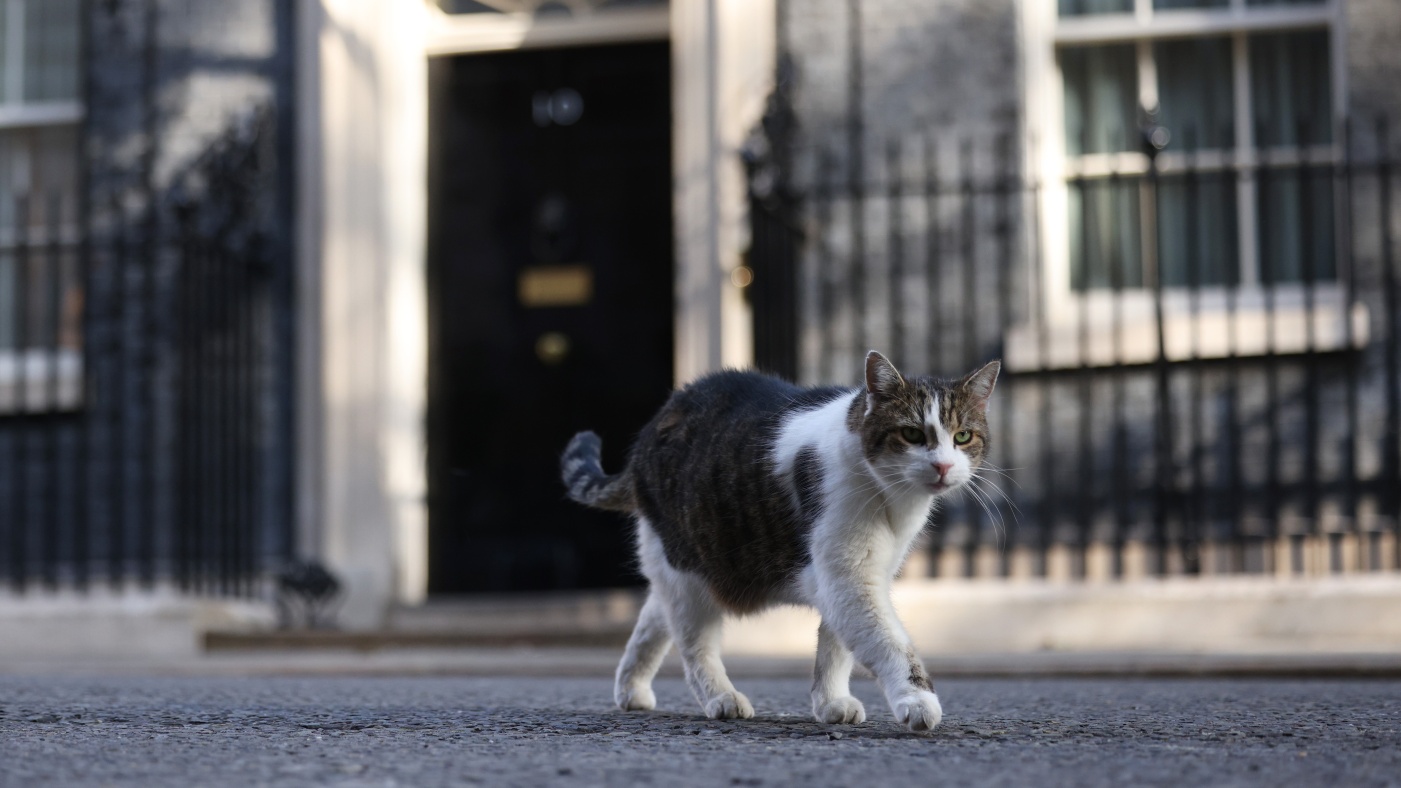Larry the cat: how chief mouser 'won the nation's hearts'
Downing Street says resident pet is 'healthy' despite reports of contingency plans for his death

A free daily email with the biggest news stories of the day – and the best features from TheWeek.com
You are now subscribed
Your newsletter sign-up was successful
Britons and possibly global leaders are breathing a sigh of relief after Downing Street dismissed reports that its chief mouser was seriously ill.
The Sun had claimed that 16-year-old tabby Larry was in "poor health" and that government officials were "working on an emergency communications plan" to decide how to break the news when he passes away. But a government spokesperson told ITV News that the world-famous cat was "happy and healthy".
Larry began his tenure as "Chief Mouser to the Cabinet Office" on 15 February 2011 under then-prime minister David Cameron, who rescued him from Battersea Dogs and Cats Home.
The Week
Escape your echo chamber. Get the facts behind the news, plus analysis from multiple perspectives.

Sign up for The Week's Free Newsletters
From our morning news briefing to a weekly Good News Newsletter, get the best of The Week delivered directly to your inbox.
From our morning news briefing to a weekly Good News Newsletter, get the best of The Week delivered directly to your inbox.
The title "might seem like a cheery nod to the cats living in 10 Downing Street", said Sky History, but this "vital and noble position" pre-dates the creation of His Royal Majesty's Government "by almost 200 years". Larry was the first to take on the official title, but the original chief mousers "landed feet first into their role in 1514".
A life of meet and greets
"Larry spends his days greeting guests to the house, inspecting security defences and testing antique furniture for napping quality," according to the government website, which lists his day-to-day responsibilities as "contemplating a solution to the mouse occupancy of the house".
Larry has welcomed a long string of global leaders, celebrities and other VIPs during his 12-year tenure. Although normally not too keen on male visitors, he reportedly took a liking to Barack Obama.
Following a visit by the then US president in May 2011, Cameron told the BBC that "Obama gave him a stroke and he was all right with Obama".
A free daily email with the biggest news stories of the day – and the best features from TheWeek.com
Over the ensuing years, Larry has "won the nation's hearts", said Sky History. The tabby has made "regular television appearances while conducting his rounds outside No. 10 Downing Street and has divided popular opinion with his staunch anti-pigeon policy".
Rishi Sunak's wife, Akshata Murty, revealed recently that her family Labrador, Nova, had "mixed emotions" about living with Larry. "They've had some heated exchanges and Larry's come out on top," she told Sky News.
Politicians 'lost' without Larry
Larry has shared No. 10 with no fewer than five prime ministers, and his length of service has beaten those of the likes of Margaret Thatcher and Tony Blair.
The Downing Street veteran is undoubtedly the best known of all of the government's recent working cats, who include Gladstone, the chief mouser at HM Treasury since 2016, and Palmerston, who performed the same role at the Foreign and Commonwealth Office until 2020.
Larry and his feline colleagues have evolved beyond being mere "workaday mousers", said Politico. They now play an expanding role in providing "a helpful public relations boost for media-savvy politicians".
Larry's unofficial Twitter account has more than 830,000 followers, far out-stripping human cabinet colleagues such as Home Secretary Suella Braverman.
"Larry’s definitely been exploited by everyone in politics, in my view," said political photojournalist Steve Back, who told Politico that Larry has been "unquestionably" successful in making politicians appeal to the public.
"You know, there are pictures of the prime minister with the cat near him or something like that – and without [Larry] they’d be lost. I don’t think they would survive without Larry."
Sorcha Bradley is a writer at The Week and a regular on “The Week Unwrapped” podcast. She worked at The Week magazine for a year and a half before taking up her current role with the digital team, where she mostly covers UK current affairs and politics. Before joining The Week, Sorcha worked at slow-news start-up Tortoise Media. She has also written for Sky News, The Sunday Times, the London Evening Standard and Grazia magazine, among other publications. She has a master’s in newspaper journalism from City, University of London, where she specialised in political journalism.
-
 House votes to end Trump’s Canada tariffs
House votes to end Trump’s Canada tariffsSpeed Read Six Republicans joined with Democrats to repeal the president’s tariffs
-
 Bondi, Democrats clash over Epstein in hearing
Bondi, Democrats clash over Epstein in hearingSpeed Read Attorney General Pam Bondi ignored survivors of convicted sex offender Jeffrey Epstein and demanded that Democrats apologize to Trump
-
 Are Big Tech firms the new tobacco companies?
Are Big Tech firms the new tobacco companies?Today’s Big Question Trial will determine if Meta, YouTube designed addictive products
